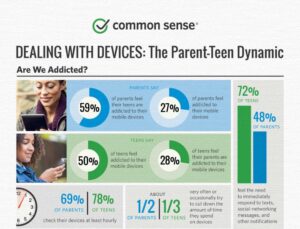“Cell phones are no longer just phones, but so much more,” says Dustyn Shroff, Vice President of GreatFlorida Insurance, Florida’s largest independent auto insurance agency.
They store our calendars and photos, provide access to our favorite stores and emails. Checking our cell phones on a regular basis has become a habit for many. However, the lure of instant information is an unhealthy attachment and cell phone addiction is real.
A poll conducted by the non-profit, Common Sense Media found 50 percent of teens feel like they are addicted to their mobile devices, with 78 percent admitting to checking their devices at least hourly. Nevertheless, this is not only a teen problem. The study reports 27 percent of adults feel they are addicted to their mobile devices with 69 percent checking them at least hourly.
What is wrong with a cell phone habit?
Countless studies show too much time on your cell phone is bad for your focus and mental health. “Most people check their phone every 15 minutes or less, even if they have no alerts or notifications,” Larry Rosen a psychology professor and author of The Distracted Mind, tells CNBC. “We’ve built up this layer of anxiety surrounding our use of technology, that if we don’t check it as often as we think we should, we’re missing out.”
Additional health issues that can develop from cell phone addiction include, poor posture which affects your spine respiratory functions and even emotions. Also, sleep. The blue light emitted from your phone can stop melatonin production in your body. Melatonin is the hormone that makes us feel sleepy and regulates out circadian rhythm. Sleep is essential to our health, especially the health of teens who are still developing.
“Aside from health and mental health problems, cell phone use continues when many drivers get behind the wheel,” reminds Dustyn Shroff, Vice President of GreatFlorida Insurance, Florida’s top independent auto insurance agency.
Nearly half of adults in the U.S. admit to reading or sending a text while driving. Almost one in three teens ages 16 to 17-years-old said they have texted while driving.
How to ween yourself and your family?
Below are some tips on how to disconnect from your cell phone.
Do not sleep with your phone. If you need an alarm clock, buy one. Do not depend on your phone. Place it away from your nightstand or bed.
Stop alert notifications. Designate a time to check in and stick to it.
Utilize the “Do Not Disturb” setting on your iPhone or place your phone to the airplane setting for a break from screen time.
When spending time with your friends and family, put it away so you won’t see it or hear it.
Try a detox. Set aside a weekend or holiday where you turn the phone off and put it away. Do not pick it up for a couple of days.





